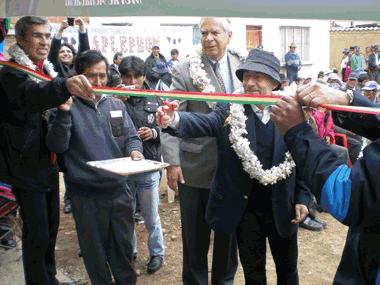
Drier for malt dregs will benefit 200 milk producing families in the highlands of La Paz
In the framework of a project which is supplemental to the construction of the La Paz-Oruro double lane highway, CAF and SNV gave a drying machine for barley malt dregs to milk producers in the Department of La Paz. The machine extends the freshness of bran, even in extreme climates, making it the ideal food for cattle.
(La Paz, November 18th, 2013). In the framework of the Inclusive Double Lane Highway program executed by CAF, Development Bank of Latin America, in alliance with SNV (Dutch Service for Development Cooperation), the Interchurch Organization for Development Cooperation (ICCO), the Avina Foundation, and UNDP's ART GOLD program, an automatic furnace to dry barley malt dregs will be given to the Departmental Federation of Milk Producers in La Paz (FEDELPAZ, for its acronym in Spanish).
The equipment is part of the productive insertion program which includes the development of capacities and technological transfer in which the Federation participates, which is part of the Inclusive Double Lane Highway project whose objective is to dynamize the economy of the communities which are close to the La Paz-Oruro Double Lane Highway, following a model of inclusive businesses that is socially profitable.
The furnace would enable the transformation, at a lower price, of malt dregs into food for cattle with a high protein content, ensuring improvements in milk production. Initially, this product would be distributed to 200 milk producing families, with a potential to grow to more than 3,000 producers in five provinces in the Department of La Paz.
Emilio Uquillas, CAF's director representative in Bolivia, states that "CAF is supporting the producers in the area of influence of the highway, not only so that they may generate more resources, but also so that they may have better living conditions and optimize their productive activity. There are interesting markets for milk products, and to reach them, quality and technology are required".
Felipe Mamani, leader of FEDELPAZ, made a commitment regarding the fact that the organization, which represents the producers of the five beneficiary provinces, will be responsible for the maintenance of the machine, which "motivates them to become model producers in the country".
At the same time, the country representative of SNV Bolivia, Julio Garrett, points out that six inclusive businesses are being carried out under this project, based on strategic alliances between companies that are consolidated in their economic activities, and segments of low income population that are their suppliers or consumers.
In this specific case, the Compañia Cervecera Boliviana (Cerveza Autentica) (Bolivian Beer Company), dedicated to the production of malt drinks and natural fruit juices, provides the barley malt waste to FEDELPAZ, which unites close to 3,400 producers from all the department of La Paz. The accidental association of both organizations makes the operation of a microenterprise possible, providing balanced food year round at accessible prices for FEDELPAZ members.
Barley malt dreg has a high protein content, but has a degree of humidity that reaches 80 percent. This machine, which generates heat using natural gas, dries the product reducing the humidity to 10 percent, so the duration of the food is extended, as well as its nutritional value.
The Inclusive Double Lane Highway
The objective of the Inclusive Double Lane Highway Program is to contribute to the economic development of communities in the neighborhood of the La Paz-Oruro Double Lane Highway, and to improve the productive capacity and income of close to 600 families that live in the area of influence of this highway, which is over 200 kilometers long.
Projects are executed that incorporate population segments with productive potential, which require technological contributions, best practices, and knowledge that allows them to become suppliers or reliable participants in the companies' production chain.
The results expected are the start up of productive undertakings that enable a sustainable and scalable generation of income, an income increase of approximately 20 percent for the 600 families, the materialization of six productive undertakings, as well as an increase of 10 percent in volume, quality, and production value.
The inclusive businesses that are under way are: boost to milk producers, development of sweet quinoa suppliers; support for suppliers of cañahua and quinoa for nutraceutical compounds (nutritional supplements for disadvantaged children and adults); improvement in the value chain of potatoes (potato seed and final product); and development of raw materials with renewable energy.
CAF's more recent content

CAF, ECLAC, IDB and PAHO Promote Sustainable Development in the G20
The Regional Organizations of the Americas congratulate Brazil on its successful G20 Presidency, highlighting its leadership on key issues such as poverty, governance, and climate change. They also reaffirm their commitment to actions that promote equity and development in the region.
Urgent Call for Action to Safeguard Caribbean SIDS at CAF Symposium
As the global community grapples with the escalating climate crisis, Caribbean Small Island Developing States (SIDS) are running out of time to secure critical investments and support needed to strengthen their economies and protect vulnerable communities from the intensifying impacts of climate change. With the window to take decisive action rapidly shrinking, CAF - Development Bank of Latin America and the Caribbean, in partnership with the Commonwealth Secretariat and the Antigua and Barbuda High Commission, brought together key stakeholders for a symposium in London to address the critical vulnerabilities Caribbean SIDS face.